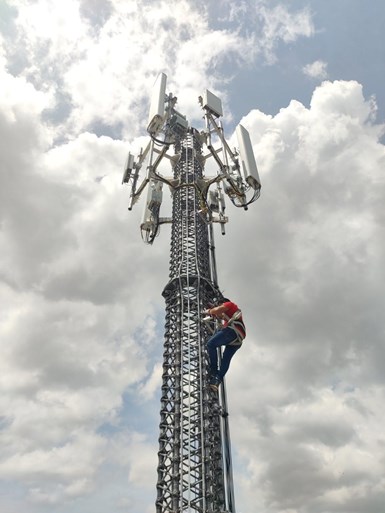Isotruss expands carbon fiber cell tower operations with new facility in Phillipines
Plant to produce IsoTruss products for telecom infrastructure market in southeast Asia.
Share

Photo Credit: IsoTruss Inc.
IsoTruss Inc. (Springville, Utah, U.S.) has announced the opening of a new production facility in the Philippines to fabricate its patented IsoTruss carbon fiber cell towers.
The new plant will reportedly enable IsoTruss to build cell towers to meet the ever-increasing demand — driven by 5G — for sustainable telecom infrastructure. Lightweight, yet strong and durable, the company says its IsoTruss cell towers can support telecom infrastructure providers seeking to implement seamless network and internet connectivity for enhanced mobile experiences, from social media, gaming, and healthcare to Smart Cities and the Internet of Things (IoT).
“We are excited to achieve this operational milestone, which marks a major step forward in our diversification through international market expansion, and underscores our commitment to sustainable infrastructure,” Nathan D. Rich, CEO, Isotruss Inc., says. “Sustainability is now widely considered a strategic advantage for telecom infrastructure providers, beyond any compliance matters. This new facility will enable us to support our clients and their customers with cost-effective, eco-friendly IsoTruss cell towers, and in doing so, will further accelerate our business growth.”
The 11,625-square-foot (1,080-square-meter) one-story manufacturing facility is located in the Berthaphil VI Industrial Park, Clark Freeport Zone, Pampanga, Philippines. The property is currently undergoing a complete renovation program, as IsoTruss repositions the facility for manufacturing, ramps up its production capabilities, and in preparation for shipments. Cell tower fabrication is slated to begin this month, with plans for the doubling of the enterprise’s workforce and manufacturing by the end of the year.
IsoTruss lattice cell towers combine high-performing continuous fiber (such as carbon, glass, aramid and more) reinforced polymer composites with a efficient geometry for efficient load carrying. The company boasts a global portfolio of more than thirty patented and patent-pending structural and composite material designs.
“Our engineers are continuously evaluating and testing methods that can further reduce production costs, such as the use of faster curing resins, while developing additional efficiencies in our production processes aimed at further reducing carbon emissions to build the infrastructure of tomorrow,” Rich adds.
“Plus, IsoTruss towers are especially well-suited to hurricane/typhoon-prone regions,” notes Cromwell Wong, COO, IsoTruss Inc., says. “Having a strategically located plant in the Philippines strengthens our ability to ship throughout the region, to help preclude any potential supply chain bottlenecks.”
IsoTruss, Inc. recently closed a Series A investment round, led by the S.G. Koenig Trust, which followed a $3 million seed investment round led by the Sojitz Corp. of Japan in Oct. 2020.
Since 2019, IsoTruss, Inc. has received multiple funding awards totaling nearly $1 million combined from both the U.S. Department of Agriculture (USDA), to support expansion of rural broadband, and the Environmental Protection Agency (EPA), for research and development of a reinforced concrete foundation for telecom towers to increase resiliency to natural disasters.
Related Content
-
Infinite Composites: Type V tanks for space, hydrogen, automotive and more
After a decade of proving its linerless, weight-saving composite tanks with NASA and more than 30 aerospace companies, this CryoSphere pioneer is scaling for growth in commercial space and sustainable transportation on Earth.
-
The potential for thermoplastic composite nacelles
Collins Aerospace draws on global team, decades of experience to demonstrate large, curved AFP and welded structures for the next generation of aircraft.
-
Sulapac introduces Sulapac Flow 1.7 to replace PLA, ABS and PP in FDM, FGF
Available as filament and granules for extrusion, new wood composite matches properties yet is compostable, eliminates microplastics and reduces carbon footprint.
















